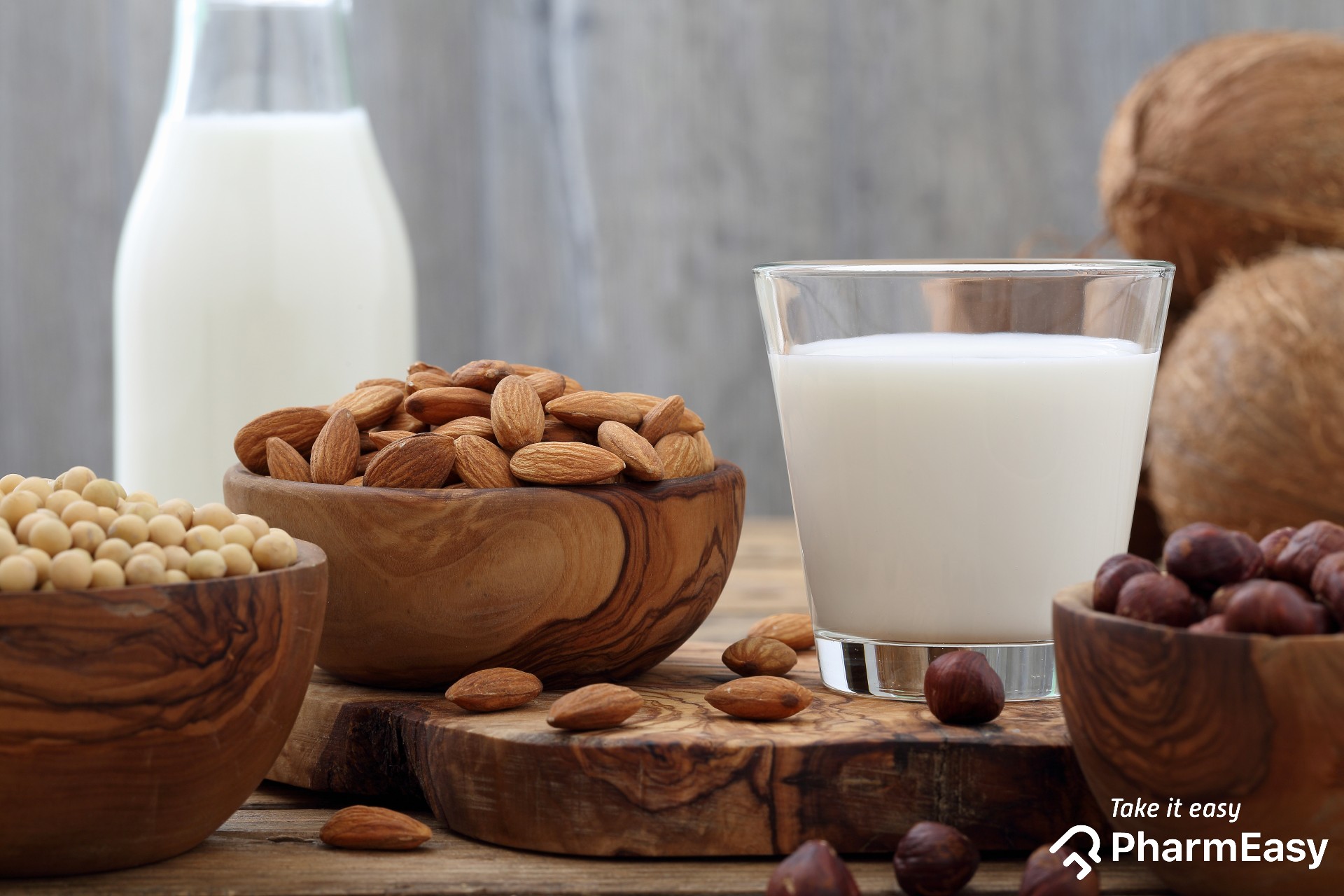6 Best Lactose-Free Substitutes For Regular Milk
By Dr. Nikita Toshi +2 more

Get,

to manage your symptom
Get your,


4 Cr+ families
benefitted

OTP sent to 9988776655



You’ve successfully subscribed to receive
doctor-approved tips on
Whatsapp

Get ready to feel your best.

Hi There,
Download the PharmEasy App now!!


Register to Avail the Offer
Send OTPBy continuing, you agree with our Privacy Policy and Terms and Conditions

Hi There,
Sign up on PharmEasy now!!
Trusted by 4 crore+ families

OTP sent to 9988776655



You have unlocked 25% off on medicines




Code: NU25
By Dr. Nikita Toshi +2 more
Table of Contents
Nowadays, lactose-free milk has become a trend in the fitness world. Also, many people are allergic to milk and dairy products due to the presence of lactose in it, and they might need lactose-free milk. But what is lactose-free milk? Is it healthy for you? What are the advantages and disadvantages of this milk? There are many queries and doubts related to this topic. So, let’s clear these doubts and know more about lactose-free milk.
Lactose-free milk is milk without lactose. Lactose is a sugar found in milk and other milk-derived products. The lactose in milk is hard to digest for some people (lactose intolerance). To make lactose-free milk, the manufacturers add lactase – a natural enzyme that breaks down the lactose into digestible sugar, glucose, and galactose, which is easy to digest.

Yes, it is! Some lactose-free milk is made from cow milk. There are also other types of milk, which are lactose-free such as almond milk, soy milk, etc. Like regular milk, it is an excellent source of calcium, protein, and vitamins.
When it comes to milk substitutes, there are multiple options, and they are as nutritious as regular milk. Many people who are intolerant to lactose can try these options –
Almond milk is one of the popular types of milk with several health benefits. Almond milk is prepared by blending almonds with water and then straining the mixture to separate the solid residue. It has a subtle, nutty flavor with a creamy texture. This milk is very popular among people who follow a vegan diet or are allergic to lactose. Studies suggest that whole almond (with skin) is more beneficial than skinless almond. However, many manufacturers use skinless almonds to prepare almond milk that might reduce its nutritious value. Here are some benefits of almond milk –
Soy milk is classic non-dairy milk with a considerable amount of protein, calcium, vitamins, and minerals. It offers a creamy, smooth texture with beany taste. It is also rich in omega-3 fatty acids and has anti-inflammatory, antioxidants, and cardioprotective properties. The benefits of soy milk are as follows –
Lactase enzyme supplements contain lactase which breaks down lactose in milk and milk-containing products. They are available as lactase enzyme tablets or drops.
Dr. M.G. Kartheeka, MBBS, MD(Pediatrics)
Coconut milk is very popular and is also easily available in the market. It is made from the white flesh of the mature coconut. The milk can be thick or thin with a creamy consistency. Coconut milk is high-calorie milk with many other nutrients. You can add coconut milk to various dishes such as cereal, smoothy, soup, and chicken curry. The benefits of this versatile milk are as follows –
Oat milk is a healthy alternative for regular milk and is the best option for people with lactose intolerance. Oats are the best source of protein and fiber. This gluten-free oat milk is creamy in texture and loaded with various nutritions. Some benefits of oat milk are as follows –
Even though lactose intolerance may not be a serious condition, it may be uncomfortable as it may cause diarrhoea, bloating, etc after consuming or drinking dairy products. Quality of life is a major factor for people with lactose intolerance, finding lactose-free options usually works to prevent chronic bloating or diarrhoea.
Dr. Ashish Bajaj, M.B.B.S., M.D. in Clinical Pharmacology and Toxicology
Rice milk is made from white or brown rice and water. It is less allergic and a safe option for people with lactose-intolerant or gluten, nut-allergic people. It is watery in consistency and sweet in taste. You can easily use it in desserts and smoothies. It has more carbohydrates than the other kinds of milk and contains less amount of protein and calcium.
Cashew milk is prepared from cashew nuts and water. It is sweet and creamy in texture. It works as a great thickener for smoothies, coffee, and desserts. It is low in calories, protein, and sugar. The best benefits of cashew milk are as follows –
Hopefully, after reading this, you’ll be able to enjoy the best benefits of lactose-free milk.
Read more about: Understanding Lactose Intolerance from Its Causes to Diet
Disclaimer: The information provided here is for educational/awareness purposes only and is not intended to be a substitute for medical treatment by a healthcare professional and should not be relied upon to diagnose or treat any medical condition. The reader should consult a registered medical practitioner to determine the appropriateness of the information and before consuming any medication. PharmEasy does not provide any guarantee or warranty (express or implied) regarding the accuracy, adequacy, completeness, legality, reliability or usefulness of the information; and disclaims any liability arising thereof.
Links and product recommendations in the information provided here are advertisements of third-party products available on the website. PharmEasy does not make any representation on the accuracy or suitability of such products/services. Advertisements do not influence the editorial decisions or content. The information in this blog is subject to change without notice. The authors and administrators reserve the right to modify, add, or remove content without notification. It is your responsibility to review this disclaimer regularly for any changes.

Leave your comment...
Comments